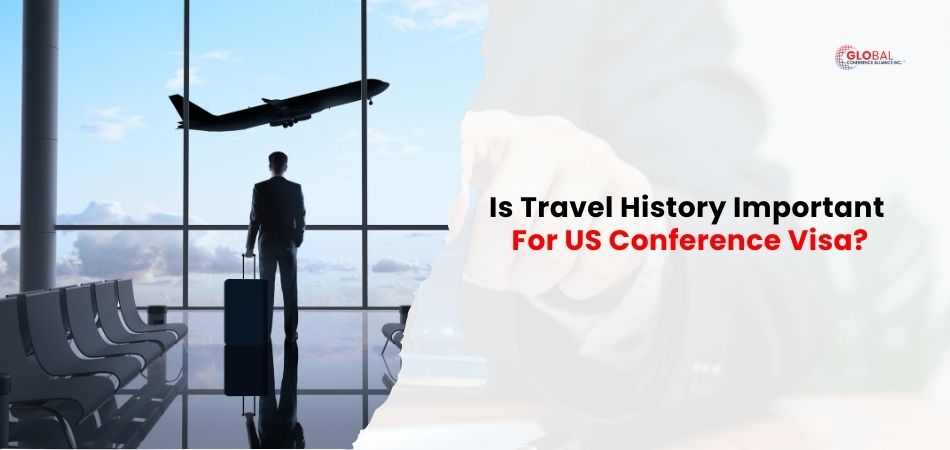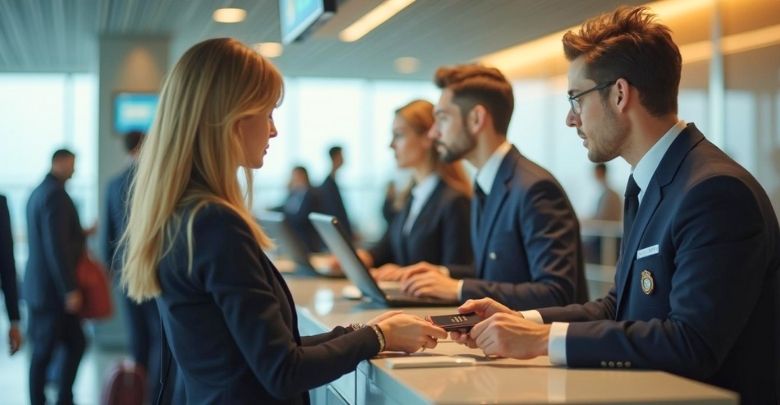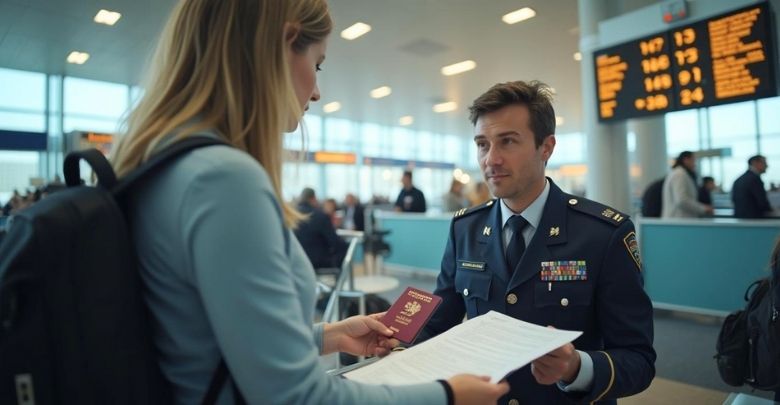Many people apply for a conference in the United States, but the process can feel difficult. If you’re preparing for such travel, you might wonder about a crucial aspect that often arises: Is travel history important for US conference visa?
Yes, travel history is essential for a US conference visa because it demonstrates your compliance with immigration laws, shows previous visa approvals, highlights visits to stable nations, verifies frequent and responsible travel, and indicates financial stability, all reassuring consular officers of your genuine intent.
Do you want to know more about travel records or are you concerned about denials in the past? Keep reading, and you’ll find every vital detail and essential information for a confident approach to your US conference visa application.
Is Travel History Important for US Conference Visa? Key Factors to Know
When applying for a US conference visa, many factors come into play, including your travel history. This history can show your credibility and help strengthen your application. Here is how travel history affects your visa process.

Travel History Shows Your Compliance with Immigration Laws
Having a solid travel history can demonstrate your adherence to immigration laws. Traveling to countries with strict visa policies, such as the UK or Schengen Area, shows that you understand visa regulations and return on time. This helps prove that you’re likely to comply with US visa rules as well.
Previous Visa Approvals Matter
Your past visa approvals can significantly influence the outcome of your conference visa application. If you’ve previously obtained a US visa or visas from other countries, especially with no violations, it demonstrates your reliability. Consular officers often view applicants with a clean history of visa approvals as less risky.
Visited Stable Countries
A history of traveling to politically stable and safe countries can be beneficial for your visa application. Such travel indicates that you are a responsible traveler who follows the regulations. Your visits to well-regulated countries help build trust with consular officers, showing that you’re unlikely to overstay or break visa conditions.
Your Travel Frequency
Frequent international travel, especially for professional or academic events, can strengthen your application. It shows that you’re genuinely involved in global networks and are likely to return after attending a conference. Consular officers prefer applicants who travel regularly and responsibly, as this indicates a consistent pattern of returning home on time.
Past Denials Can Be a Red Flag
If you’ve faced visa denials in the past, it may raise concerns for the consular officer. Denials can suggest you might be a risk for overstaying or violating visa terms. However, if you provide a clear and honest explanation, you may be able to address concerns and improve your chances of approval.
Length of Past Stays
Your history of staying within visa limits in previous travels adds credibility to your application. If you’ve followed the visa terms and returned home on time in the past, it shows that you respect immigration regulations. The longer you’ve stayed within legal limits in other countries, the more trustworthy you appear to US authorities.
Travel to Countries with Similar Visa Requirements
Having a travel history with countries that share similar visa requirements to the US can work in your favor. For example, traveling to Canada, Australia, or the UK demonstrates your ability to meet strict immigration criteria. Consular officers may find this reassuring and view you as a low-risk applicant for a US visa.
Financial Stability Linked to Travel
A well-maintained travel history to countries with higher living costs or stricter financial requirements can be a sign of your financial stability. Consular officers look for applicants who can support themselves during their visit. If you’ve successfully traveled to such countries in the past, it highlights your ability to fund your trip to the US.
A Balanced Travel History is Key
Having a well-rounded travel history, where you’ve visited different countries for various reasons—whether personal, professional, or academic—can work in your favor. A balanced history shows that you’re a responsible traveler with multiple purposes for international travel, which helps demonstrate your genuine intent for attending the US conference.
Your application for a US visa is strengthened by a strong travel record. A diverse and responsible travel record can increase your chances, especially when attending conferences in USA 2025 with invitation letter, showcasing your intent to comply with regulations.
Why Immigration Officials Consider Travel History for US Visas?
Knowing why travel history matters can help you prepare a stronger visa application. Immigration officials review past travels to assess reliability and intentions. Explore the key reasons behind their focus on your travel records below.
Demonstrates Compliance with Laws
Your travel history shows whether you’ve followed the rules in other countries. If you respected visa terms and returned on time, it signals you’re likely to do the same in the US. This reliability makes your application more trustworthy to officials.
Shows Return Intentions
Travel records help officials determine if you plan to return home after your visit. Frequent trips and timely returns suggest strong ties to your home country. This assurance reduces concerns that you might overstay your US visa.
Reflects Financial Stability
A history of international travel indicates you can support yourself financially. Being able to fund your trips shows you have the resources to cover your stay in the US. Financial stability is a key factor in visa approvals.
Indicates Travel Patterns
Consistent and purposeful travel patterns highlight your genuine reasons for visiting. Whether for work, study, or conferences, clear travel intentions make your application more credible. It helps officials understand your motives better.
Assesses Risk Factors
Officials use travel history to identify any potential risks. A clean record with no overstays or violations lowers the perceived risk. This assessment helps them make informed decisions about your visa application.
Having a solid travel history can greatly improve your US visa chances. By showcasing your responsible travel behavior, you present yourself as a trustworthy applicant. Ensure your records reflect positive patterns to enhance your visa application success.
Red Flags in an Applicant’s Travel Record Might Affect US Conference Visa Approval
Your travel history is a key factor in the U.S. conference visa process. Authorities carefully examine past travel patterns to assess your intentions and credibility. Knowing how travel history impacts your application is essential for a strong submission. Here are some more details about it:
Previous Visa Denials
A history of visa refusals, especially for countries like the U.S. or other Schengen states, can raise doubts about your intentions. If you’ve been refused a visa in the past, it might signal that you failed to meet requirements or provided inaccurate information. For example, Canada visa refusal might affect USA conference visa, since visa denials in one country might be seen as indicative of future risks in another.
Inconsistent Travel History
Frequent and unexplained international travel, especially to countries of concern, might raise suspicions. If your travel history seems erratic or lacks purpose, it may lead U.S. authorities to question your intentions and commitment to returning home after the conference. A consistent and documented history helps build credibility.
Overstaying in Other Countries
If you have previously overstayed your visa in another country, it can be a significant red flag. U.S. authorities may worry you could overstay your visa in the U.S. as well. Having a clean record of following visa conditions in the past strengthens your application for a U.S. conference visa.
Misleading Information on Travel Records
Any inconsistencies or discrepancies in your travel records could lead to a visa refusal. If your travel history does not match what you’ve stated in your application, authorities may suspect that you are hiding something. It’s essential to be truthful and transparent about your previous travels.
Travel to High-Risk Countries
Frequent travel to high-risk countries may raise concerns about your background or security. U.S. officials tend to scrutinize applicants who have visited regions with unstable political climates or that have a reputation for terrorism-related activities. If you’ve traveled to such countries, be prepared to explain the purpose and nature of your visits.
Your travel history plays an essential role in securing a U.S. conference visa. Having a solid and transparent record with no red flags can increase your chances of approval. You should provide honest and accurate details about your previous travels when applying.
What to Do if You Have Limited or No Travel History?
Having limited or no travel history can make applying for a visa more challenging. Many visa authorities, including the U.S., consider travel history a key factor when analyzing applications. However, there are ways to improve your chances. Keep reading to find out how to handle this situation.
Provide Solid Financial Proof
When you have a limited travel history, showing that you can financially support yourself is essential. Presenting strong financial evidence, like bank statements or proof of stable income, assures the authorities that you are capable of funding your trip. Financial security often compensates for a lack of previous travel and increases your chances of approval.
Highlight Ties to Your Home Country
A common concern for applicants with no travel history is their intention to return home. To alleviate this, demonstrate clear ties to your home country, such as a stable job, family responsibilities, or ownership of property. These indicators help show that you are unlikely to overstay your visa or remain in the U.S. illegally.
Show Purpose of Your Trip Clearly
If your travel history is limited, the purpose of your trip becomes crucial. Be clear and detailed about why you are visiting, whether it’s for a conference, research, or a work-related event. Provide supporting documents like event invitations or registration forms to demonstrate that your trip is planned and essential.
Demonstrate Reliable Future Travel Plans
Even if you lack past travel experience, presenting well-organized and dependable travel plans can help. Include evidence such as flight bookings, hotel reservations, and event tickets. These documents prove that your trip is thoughtfully planned and show that you have a clear return plan, strengthening your visa application.
Provide Character References
In the absence of travel history, character references can greatly enhance your application. Ask employers, professors, or community leaders to provide recommendation letters highlighting your trustworthiness and integrity. These references can offer additional assurance to the visa officer that you are a reliable applicant with good intentions.
While having limited or no travel history may seem like a disadvantage, there are ways to improve your chances of approval. By providing financial proof, showing strong ties to your country, and having well-documented plans, you can still strengthen your visa application and improve your approval odds.
Other Factors Are as Important as Travel History for US Visas
When applying for a U.S. visa, many factors are considered beyond travel history. Visa officers review the applicant’s overall profile, looking at various aspects that influence the decision. Below are a few other important criteria that affect your visa approval.
Financial Stability
One of the most crucial factors in visa approval is your financial stability. You need to prove that you can support yourself during your stay in the U.S. and that you won’t become a financial burden. Providing bank statements, pay slips, or evidence of a stable income can help show that you are financially responsible.
Purpose of Visit
Clearly stating the purpose of your visit is key. Whether you’re attending a conference, a business meeting, or a study program, you need to provide relevant documents like invitations or registrations. This shows that your visit is legitimate and not intended for tourism or other unauthorized activities.
Ties to Home Country
Visa officers need to be convinced that you have strong reasons to return home after your trip. Evidence of strong ties can include a stable job, family obligations, or ownership of property. These indicators assure authorities that you won’t overstay your visa in the U.S.
Previous Visa Compliance
If you’ve previously traveled to the U.S. or other countries, you need to show that you complied with the terms of your visas. This includes adhering to visa rules, staying within the permitted duration, and not engaging in unauthorized activities. A good track record can enhance your application.
Health and Medical Considerations
Applicants may face challenges if they have unresolved health issues that could affect their ability to travel or stay in the U.S. You should disclose any health issues for USA conference visas that could impact your travel plans. If medical conditions exist, providing documentation of treatment or stability can help minimize concerns.
While travel history is an important factor, several other elements play a key role in the visa approval process. Financial stability, purpose of your visit, ties to home, compliance with previous visas, and health issues are all critical factors to consider when applying.
FAQs About Is Travel History Important for US Conference Visa?
When applying for a U.S. conference visa, you may have additional questions regarding how travel history impacts your chances of approval. Below are some frequently asked questions that offer further insights into this topic and help guide you through the visa application process.
Can A Lack Of Travel History Impact My Chances Of Getting A U.S. Conference Visa?
A lack of travel history can raise concerns about your intentions. However, if you demonstrate strong financial stability, clear ties to your home country, and a well-documented purpose for your visit, you can still improve your chances. Transparency and preparation are key in such cases.
Does The Duration Of My Previous Trips Matter For A U.S. Conference Visa?
Yes, the duration of your past stays can be significant. Short, consistent stays in other countries show that you respect visa rules. Long-term stays or overstaying in the past can raise doubts. It’s important to show adherence to visa limits to build trust with U.S. authorities.
Will Frequent Travel To Neighboring Countries Improve My Chances?
Frequent travel to neighboring countries may demonstrate that you have experience traveling internationally. It suggests you’re comfortable with following visa regulations and returning home. While it’s not as influential as travel to high-regulation countries, it still helps present you as a responsible traveler.
How Do I Prove That I Will Return Home After My U.S. Conference Visit?
To prove your intent to return, provide documents such as an employment letter, property ownership, or family commitments. These show strong ties to your home country, which reassure authorities that you plan to return after your U.S. conference visit.
Can A Travel History To Low-Risk Countries Benefit My U.S. Visa Application?
Yes, traveling to low-risk countries can enhance your visa application. It indicates that you respect immigration laws and follow regulations. Visits to well-regulated, politically stable countries can make you seem like a lower risk to U.S. authorities, helping strengthen your application.
How Does Traveling For Professional Reasons Affect My Visa Application?
Traveling for professional reasons can positively impact your U.S. conference visa application. It shows that you are involved in legitimate international activities and are more likely to return home after the event. Providing supporting documents like conference invitations or work-related travel records can strengthen your application.
Final Word
Travel history plays a significant role in the U.S. conference visa application process. A well-documented and positive travel record can help you demonstrate compliance with immigration laws and your intentions to return home after attending the conference. A solid travel history builds credibility and trust with consular officers.
So, is travel history important for US conference visa? Yes, it is an essential factor in your application. While it’s not the only criterion, a clear and consistent travel history shows that you understand and follow visa rules, increasing the likelihood of approval. Your past travel behavior helps the authorities assess your risk and trustworthiness.
To improve your chances, be prepared to provide supporting documents, including financial proof, ties to your home country, and clear reasons for your visit. Ensure your travel history is transparent and accurate. Best of luck with your application! Stay confident and organized, and you can boost your chances for a successful outcome.







